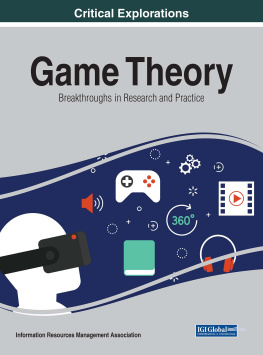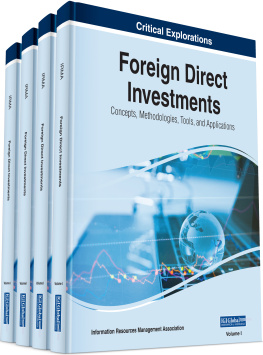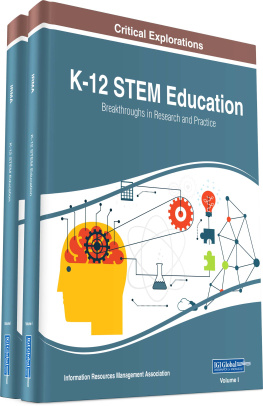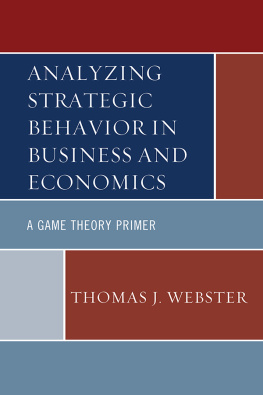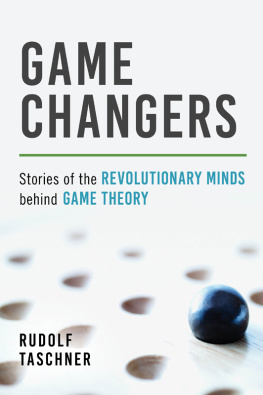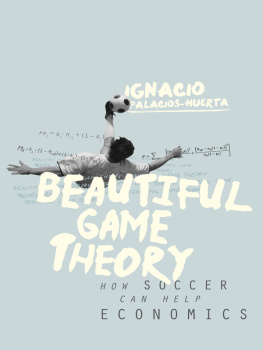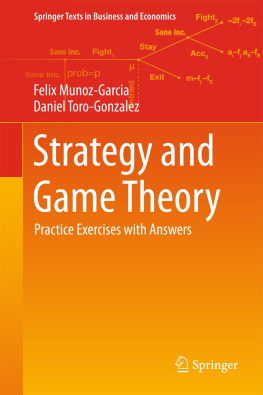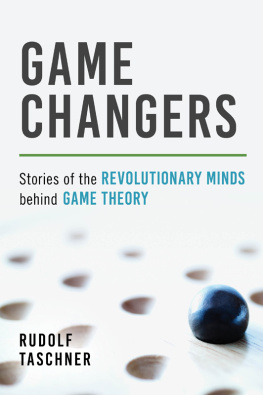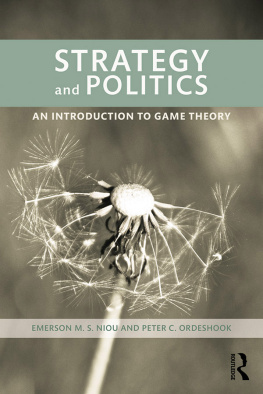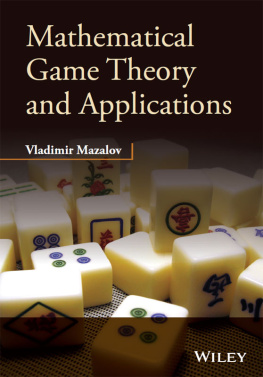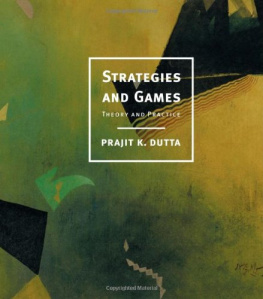Game Theory:
Breakthroughs in Research and Practice
- Information Resources Management Association
USA
Published in the United States of America by IGI Global (an imprint of IGI Global) 701 E. Chocolate Avenue Hershey PA 17033 Tel: 717-533-8845 Fax: 717-533-8661 E-mail: cust@igi-global.com Web site: http://www.igi-global.com/reference
Copyright 2018 by IGI Global. All rights reserved. No part of this publication may be reproduced, stored or distributed in any form or by any means, electronic or mechanical, including photocopying, without written permission from the publisher.
Product or company names used in this set are for identification purposes only. Inclusion of the names of the products or companies does not indicate a claim of ownership by IGI Global of the trademark or registered trademark.
Library of Congress Cataloging-in-Publication Data
Names: Information Resources Management Association.
Title: Game theory : breakthroughs in research and practice / Information
Resources Management Association, editor.
Description: Hershey PA : Information Science Reference, [2018] | Includes
bibliographical references.
Identifiers: LCCN 2017008819| ISBN 9781522525943 (hardcover) | ISBN
9781522525950 (ebook)
Subjects: LCSH: Game theory. | Radio resource management (Wireless
communications)
Classification: LCC QA269 .G3536 2018 | DDC 519.3--dc23 LC record available at https://lccn.loc.gov/2017008819
British Cataloguing in Publication Data
A Cataloguing in Publication record for this book is available from the British Library.
All work contributed to this book is new, previously-unpublished material. The views expressed in this book are those of the authors, but not necessarily of the publisher.
Editor-in-Chief
Mehdi Khosrow-Pour, DBA
Information Resources Management Association, USA
Associate Editors
Steve Clarke, University of Hull, UK
Murray E. Jennex, San Diego State University, USA
Annie Becker, Florida Institute of Technology, USA
Ari-Veikko Anttiroiko, University of Tampere, Finland
Editorial Advisory Board
Sherif Kamel, American University in Cairo, Egypt
In Lee, Western Illinois University, USA
Jerzy Kisielnicki, Warsaw University, Poland
Amar Gupta, Arizona University, USA
Craig van Slyke, University of Central Florida, USA
John Wang, Montclair State University, USA
Vishanth Weerakkody, Brunel University, UK
Preface
The constantly changing landscape surrounding game theory makes it challenging for experts and practitioners to stay informed of the fields most up-to-date research. That is why IGI Global is pleased to offer this single-volume comprehensive reference collection that will empower students, researchers, and academicians with a strong understanding of these critical issues by providing both broad and detailed perspectives on cutting-edge theories and developments. This compilation is designed to act as a single reference source on conceptual, methodological, and technical aspects, as well as to provide insight into emerging trends and future opportunities within the discipline.
Game Theory: Breakthroughs in Research and Practice is organized into three sections that provide comprehensive coverage of important topics. The sections are:
- 1. Business and Economics
- 2. Computational Techniques
- 3. Network Architecture
The following paragraphs provide a summary of what to expect from this invaluable reference source:
Section 1, Business and Economics, opens this extensive reference source by highlighting the latest game theory trends and application in the prominent fields of business and economics. Through perspectives on management strategies, sustainability, and emerging markets, this section demonstrates the value of utilizing game theory in business and economic endeavors. The presented research facilitates a better understanding of how these applications can optimize processes and procedures.
Section 2, Computational Techniques, includes chapters on emerging innovations for optimized game theory applications. Including discussions on the Internet of Things, mobile distributed systems, and heterogeneous networks, this section presents research on the impact of technology in the game theory field. This inclusive information assists in advancing current practices in game theory practices through computational techniques.
Section 3, Network Architecture, presents coverage on novel game theory strategies for network design. Through innovative discussions on network security, wireless sensor networks, and cognitive radio networks, this section highlights the innovative applications of game theory for network architecture. These inclusive perspectives contribute to the available knowledge on utilizing game theory paradigms on network design.
Although the primary organization of the contents in this work is based on its three sections, offering a progression of coverage of the important concepts, methodologies, technologies, applications, social issues, and emerging trends, the reader can also identify specific contents by utilizing the extensive indexing system listed at the end.
As a comprehensive collection of research on the latest findings related to Game Theory: Breakthroughs in Research and Practice, this publication provides researchers, practitioners, and all audiences with a complete understanding of the development of applications and concepts surrounding these critical issues.
Section 1
Business and Economics
Chapter 1
A Survey of Game Theory Applications in Turkey
- . Erdem Seilmi
Hacettepe University, Turkey
ABSTRACT
This chapter gives a brief review of game theory applications in Turkey. The intention is twofold: first, to provide the reader with an overview of game theory and its applications in Turkey; second, to explore the tractability of economic problems when formulating them as game theory models. The discussion starts with a general description of game theory models and follows with an investigation of game theory applications performed in Turkey.
INTRODUCTION
Game theory has been widely applied to many economic issues as an effective tool for economic research in developed countries. However, in emerging economies game theoretic techniques have not yet received proper attention. Until the 1970s, the literature of game theory applications to economics was inadequate; however, as a result of the influence of these applications on developmental economics, games have become commonly used in Europe and the USA for modeling situations in which decision makers must make specific actions which have mutual consequences (Fudenberg & Tirole, 1991; Shubik, 1991). Game theory is a mathematical theory of decision making with the outstanding feature of modeling conflict and cooperation in explicit forms. The most critical element in the development of the theory of games is the formal description of the games, consisting of a set of players, a set of strategies, and specification of players payoffs for the possible outcomes of the game.
The attention drawn to game theory may be attributed to the pioneering work by von Neumann and Morgenstern (1944)1. After the appearance of Theory of Games and Economic Behavior, game theory, as the analysis of strategic interaction, has been applied to economics (Morrow, 1994). Since the Nobel Memorial Prize in Economics was awarded to John Nash in 1994, the number of economic studies of game theory has increased rapidly. However, the small number of studies in developing economies still can be interpreted as a warning signal which indicates that more research should be devoted to game theory, especially in these countries. Because this useful tool lies at the heart of the individual decision making, the limited number of the economic studies and findings has historically been the central shortcoming of the extant literature in emerging markets.

